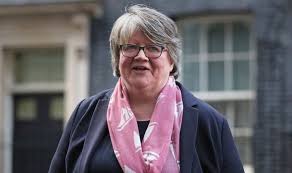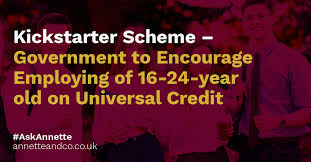Work TV
Watch our TV Channel dedicated to the ‘World of Work’. Explore our video library for informative videos featuring career opportunities at leading companies, franchising opportunities, further education and recruitment professions and their services.
Simon Collyer
International Day of Awareness of Food Water Announced for September 29th
FOOD WASTE - One for the diary - date, September 29th.
The United Nations General Assembly (UNGA) designated 29 September as the International Day of Awareness of Food Loss and Waste (IDAFLW) to raise awareness on the importance of the problem and its possible solutions at all levels and to promote global efforts and collective action towards meeting SDG target 12.3.

ABC Comment, have your say:

The London Mayor Launches Twelve Advice Videos in Multiple Languages
MAYOR OF LONDON - The Mayor of London is seeking to equip Londoners with knowledge about their rights at work and how to enforce them. In partnership with London-based civil society organisations, the Greater London Authority have produced twelve short videos answering frequently asked questions from Londoners about their rights in the workplace in the context of Covid-19, relating to issues like self-isolation, health and safety and the furlough scheme.
The videos have been developed in partnership with a number of expert charities and advice centres, with the hope that the videos will be a useful resource for Londoners experiencing problems at work.
Some of the videos will have particular relevance for parents and those with childcare responsibilities, Londoners with poor mental health, Londoners with insecure immigration statuses, and Londoners at risk of labour exploitation.
The videos have been translated into a number of languages, including Polish, Romanian, Spanish, Portuguese, Romanes, Hindi, Tagalog, Italian and Bahasa Indonesia, and are designed to help citizens including ethic minoritory's undederstand help that is available and their rights.
Click below to find out more:
ABC Note: The Mayor of London is the executive of the Greater London Authority. The current mayor is Sadiq Khan, who took office on 9 May 2016.
ABC Comment, have your say below:

Scottish Diners Eat More Than 6.3 Million Meals to Support Hospitality Sector
GOVERNMENT INCENTIVE SCHEME - The government has announced that thousands of jobs across Scotland have been supported after statistics revealed that more than 6.3 million meals were eaten in Scotland as part of the landmark Eat Out to Help Out scheme, and more than 100 million eaten UK-wide.
Rishi Sunak said the scheme’s popularity had helped support the livelihoods of the 1.8 million people working in the hospitality sector across the UK and driven the nation’s economic recovery from coronavirus.
Latest figures show that Eat Out to Help Out significantly boosted restaurant bookings during August, with the scheme growing in popularity each week.
By midnight on 27 August, 6,333,000 meals were eaten at 8,543 establishments across Scotland, making claims worth more than £38 million, with an average discount of £6.10 a meal. This has meant more jobs being supported as a result of people going out and boosting the economy.
Regulars have complained about their favourite eateries being booked out but I have given patrons the chance to try new restaurants.
These numbers are likely to grow, with restaurants having until the end of September to claim back the 50% government-funded discount applied to bills in August.

Image: Eat Out to Help Out considered a resounding success.
ABC Comment, have your say below:

The US Social Security Administration Adopts Microsoft Teams For Customer Hearings
TECHNOLOGY - The Social Security Administration announced a new service for people awaiting a hearing decision.
In addition to telephone hearings, Social Security will offer the opportunity for an online video hearing using the platform beginning this fall. This new free service will allow applicants and their representatives to participate in the hearing from anywhere they have access to a camera-enabled smartphone, tablet, or computer. This stable and secure online platform allows the Social Security judge to see and interact with applicants and their representatives just like an in-person hearing, while maintaining privacy of the claimant’s information.
Other hearing experts, such as medical or vocational experts, may participate as well.


ABC Comment, have your say below:

Crackdown on Private Car Parking Firms Will Eliminate Unfair Fines
PRIVATE PARKING FINES - The ABC has complained about unfair private parking fines being levied against motorists by private parking companies.
We recomended that job applicants boycott interviews held at Holiday Inn hotels whose car parks are managed by Parking Eye one of the UK's most notorious private parking firms.
Unfair Private Parking Tickets Will Be Eliminated Through the Introduction of New Rule For Private Car Parks
New Appeals Charter will eliminate fines for motorists who make genuine errors or have mitigating circumstances

ABC Note: The ABC has recommended that candidates attending job interviews boycott, job interviews held in Holiday Inn hotels due to the high cost of fines by Parking Eye that manage Holiday Inn car parks. Job interviews can overrun and a candidate can be subject to a large fine for overstaying the two-hour time limit.
Implementing a tiered system to differentiate between major and minor offences
Increasing maximum fines for serious offences
Unfair private parking tickets will be eliminated through the introduction of new rules for private car parks, the Communities Secretary Rt Hon Robert Jenrick MP has announced today (31 August 2020).
The government has put forward proposals designed to crack down on rogue car parking firms that will form part of a new Parking Code of Practice and Framework.
The proposals include, a maximum cap for parking fines, a 10-minute grace period before a late fine can be issued and a requirement for parking firms to clearly display pricing and terms and conditions.
The new measures will be a major boost to millions of motorists in England, Scotland and Wales and will help to draw people back to their local high streets by eliminating the fear of being penalised with an unfair parking ticket.
Communities Secretary Rt Hon Robert Jenrick MP said:
These new measures are a victory for the millions of motorists across the country. They will put a stop once and for all to rogue parking firms using aggressive tactics and handing out unfair parking tickets with no right to appeal, while also boosting our high streets by making it easier for people to park near their local shops without being unfairly fined
Our proposals will restore common sense to the way parking fines are issued, while cracking down on the worst offenders who put other people in danger and hinder our emergency services from carrying out their duties.
Fresh measures proposed in the new Code and Framework include the creation of a mandatory single Appeals Service and Appeals Charter for motorists to turn to if they are unfairly fined. Under options set out in the Appeals Charter, motorists could be able to appeal their fine and see it reduced to a maximum of £20, or cancelled entirely if:
- they have a mitigating reason for overstaying their parking ticket such as their vehicle breaking down
- they have made a genuine innocent error, like keying in a digit in their number plate incorrectly
- they have a valid ticket, permit or Blue Badge but failed to display it correctly
The consultations also propose:
A new, tiered approach to parking fines with a cap for less serious offences between £40 and £80 depending on the parking charge system chosen (but both lower than the current £100 cap), and a new, increased fine of up to £120 for drivers who wrongly park in disabled bays or ambulance bays
A compulsory 10-minute grace periods before firms can issue a late fine
A compulsory 5-minute cooling-off period in which a motorist can consider the terms and conditions and change their mind about parking
A crackdown on parking firms using aggressive or pseudo-legal language to intimidate motorists into paying fines
A requirement for parking firms to clearly display pricing and terms and conditions of parking, contact details and how to appeal a charge
High Streets Minister Simon Clarke MP said:
We want to get people back onto the high street to shop local and support small businesses, and these proposals mean motorists will be able to do so without having to worry about being landed with an unjust ticket and no way to appeal.
These measures will drive up standards in the parking industry by clamping down on rogue operators and offering a safety net so that responsible motorists who make an innocent mistake are not penalised unfairly for doing so.
Unlike existing voluntary codes set by industry, the new Code and Enforcement Framework will be mandatory and provide a single set of rules to follow. Rogue firms which break the Code could be barred from requesting Driver and Vehicle Licensing Agency (DVLA) data, making them unable to pursue motorists for their charges through the post.
Steve Gooding, Director of the RAC Foundation said:
The publication of the government’s consultation document alongside the BSI’s draft code of practice is a major milestone in bringing the provisions of Sir Greg Knight’s Parking Act to life.
It is clearly important that we get the code of practice, and the framework within which it will sit, right, so I would encourage everyone with an interest to respond with their views.
Scott Steedman, Director of Standards at BSI said:
In our role as the National Standards Body, BSI brought together industry experts and consumer groups to reach consensus on a new standard to support better parking practice in the operation and management of parking facilities on private land.
This new standard, called PAS 232 Privately managed parking – Operation and management, is available for public comment until 12 October 2020. Once all the comments have been reviewed by the steering group, we plan to publish the standard at the earliest opportunity.

Image: Motorists champion, Gregg Knight MP Conservative MP for East Yorkshire.
Sir Greg Knight, Member of Parliament for East Yorkshire who piloted the Parking (Code of Practice) Bill through Parliament and onto the Statute Book said:
I am delighted that a new statutory Code of Practice on parking now moves a step closer to being introduced. This whole process is intended to stop unfair and dodgy practices arising. The new Code of Practice, when implemented, will, I believe, make the process of parking fairer and more transparent for all concerned.
The Parking (Code of Practice) Act became law in March 2019 and builds on action the government has already taken to tackle rogue private parking firms, including banning wheel clamping and towing and stopping over-zealous parking enforcement by councils.
Further information
The consultation for the new Parking Code of Practice will be published on the BSI website and will run until 12 October.
The consultation for the new Parking Enforcement Framework will be published on GOV.UK and will also run until 12 October.
The Parking (Code of Practice) Bill was a Private Members Bill introduced by Sir Greg Knight MP, supported by the government and received Royal Assent in March 2019. It covers England, Wales, and Scotland – creating consistency for motorists everywhere in Britain.
Currently there are 2 parking trade associations, the British Parking Association and the International Parking Community. Each has a Code of Practice that their members are required to abide by, but there is no single set of rules, so motorists are vulnerable to bad private parking practices such as deliberately poor signage and unfair parking fines.
The government is proposing that the New Appeals Charter will reduce parking charges to between £0 and £20 for the issues below:
Significant Evidence of mitigation or genuine, legitimate reason - fine cancelled
Non-evidenced mitigation – if accepted, fine reduced to between £0 and £20 dependent upon the circumstances
Evidenced vehicle breakdown – fine cancelled for motorist and recovery vehicle
Failure to display permit/Blue Badge/pay and display ticket (copy then supplied) – fine reduced to between £0 and £20.
Keying error at pay and display machine – Minor (one letter wrong, removed or swapped or numbers and letters in the wrong order bur still recognisable) – fine cancelled
Keying error at pay and display machine – Major (motorist enters their partner’s registration, multiple keying errors or only partial number plate entered) – fine reduced to between £0 and £20
The government is also proposing a new tiered system for parking fines. There are 2 options for this, with 3 or 2 tiers proposed. The 3-tier system could operate as follows:
Upper Level Breach up to a cap of £120 (discounted to £70 when paid within 14 days) for the most serious breaches which put motorists or others in danger or relate to anti-social behaviour with a direct impact on the vulnerable or business revenue, including:
Parking in an accessible bay (Blue Badge bay)
Parking where parking not permitted such as in an ambulance bay or outside fire escape.
Obstructive or dangerous parking to the detriment of others
Parking in service/loading areas and/or yellow box, hatched areas
Middle Level Breach up to a cap of £100 (discounted to £60 when paid within 14 days) for breaches which, while not as serious as the upper level, still impact upon businesses, landowners, the environment and genuine customers or car park users:
Parking in a reserved bay (parent and toddler)
Parking on pavement where parking is not permitted
Parked in Staff Parking Only area
Overstay of maximum free period or paid-for tariff.
Vehicle exceeds maximum weight and/or height and/or length permitted in the area
Parking across multiple bays
Lower Level Breach up to a cap of £80 (discounted to £50 when paid within 14 days) for poor parking or issues which cause inconvenience to other car park users:
Parking in bays for other classes of vehicles such as motorcycles or scooters, bicycles or taxis.
Use of an expired permit
Re-parking / returning within period prohibited
Parking where parking not permitted such as grass verges or landscaped areas
Parking with engine running where prohibited
Permit displayed not valid for area occupied
Alternatively, it could result in a 2-tier system that would mirror that found in local authority parking regulation. This local authority system operates as follows outside of London:
Upper level breach between £60 – 70 (discounted to £30 – 35), including:
Parked in a suspended bay/space or part of bay/space
Parked in a residents’ or shared use parking place without clearly displaying either a
- permit or voucher or pay and display ticket issued for that place
Parked in a restricted area in a car park
Parked in a designated disabled person’s parking place without clearly displaying a
- valid disabled person’s badge
Lower level breach between £40 – 50 (discounted to £20 – 25)
All other contraventions would fall into this penalty charge level.
For London, penalty charges are set by the London local authorities acting jointly and by Transport for London, with the approval of the Mayor (and provided that the Secretary of State does not object.) There are 2 tiers as set out below with a higher penalty charge level and different contraventions that fall into each level. Again, lower-tier councils can choose a slightly lower charge, as long as they apply it consistently:
Upper level breach between £110 – 130 (discounted to £55 – 65)
Lower level breach between £60 – 80 (discounted to £30 – 40)

ABC Comment, have your say below:

Does Your Business Want to Support Kickstart?
FOR EMPLOYERS - Are you an employer that wants to take part in Kickstart and give young people a job opportunity?
Becoming a representative
A Kickstart Scheme application must be for a minimum of 30 job placements. If a single employer cannot provide this many job placements, they can:
- join a group of other employers, nominating a representative for the group to submit the application
- register their interest with existing representatives, such as local authorities, chambers of commerce or trade bodies
The representative will check that your job placements are eligible for the Kickstart Scheme, and submit the application for funding on your behalf.
Responsibilities of a representative
The representative must have:
- experience of managing partnership agreements with third parties
- robust financial and governance processes to manage the application
The DWP will carry out an assessment of the suitability of representatives and may contact you for further information during the application process.
The DWP are not currently accepting applications from representatives who do not have this experience, we will provide further information in future on how these groups can become a representative.
How to apply as a representative
As a representative, you need to have a minimum of 30 job placements from your group of employers before applying.
You will need:
- details of the job placements proposed by your group of employers
- details of their business
- information about the support they plan to offer the young people
Find out how to apply for a grant.
Get help to become a representative
You can contact your local Jobcentre Employer Partnership team for help.
From the government:
Employers of all sizes are being invited to apply for generous cash incentives to help them take on new apprentices and get more people into work, Apprenticeships and Skills Minister, Gillian Keegan has announced today (1 September).
Apprenticeships are a great way to get ahead in a wide range of exciting industries, and they will also play a vital role in delivering the skills employers and the economy need to recover after the coronavirus outbreak.
As part of the Government’s Plan for Jobs, employers are being offered £2,000 for each new apprentice they hire aged under 25, and £1,500 for each newly recruited apprentice aged 25 and over. This includes taking on an apprentice who has been made redundant.
The cash boost is designed to support employers to cover the cost of recruiting an apprentice such as providing facilities, uniforms, helping with travel costs or to help pay their salary.
Employers who want to take advantage of the offer can apply through the government’s award-winning digital apprenticeship service.
Gillian Keegan, Minister for Apprenticeships and Skills said:
We recognise the huge impact coronavirus has had on individuals and businesses up and down the country.
Through our Plan for Jobs we have taken unprecedented steps to protect, support and create jobs, including driving more high quality apprenticeship opportunities to help get our economy moving.
To support this, from today, employers can sign up to receive £2,000 for each new apprentice they take on aged under 25 and £1,500 for those aged 25 and over. This offer will help more employers large and small to invest in the skilled workforce they need to help them recover and grow.
I strongly encourage as many employers as possible to apply now, and take advantage of this generous offer whether it is used to recruit apprentices for the first time or expand their current apprenticeship offer.
The Chancellor of the Exchequer said:
Apprenticeships play a crucial role in developing the skills people need, particularly young people, as they seek work in these challenging times.
I urge every employer, big or small, national or local, to sign up to our offer and support apprentices as we continue our economic recovery. Our Plan for Jobs will create, support and protect jobs across all regions of the UK, and ensure our economy is fit for the future.
This new cash incentive for employers is on top of the existing £1,000 payment for new 16-18 year-old apprentices, and those aged under 25 with an Education, Health and Care Plan.
To support people, particularly young people, affected by Covid-19 the Government has also announced a range of support including:
- £111 million boost to triple the number of traineeships available across England – the largest-ever expansion of traineeships – to help make sure more 16-24 year olds have the skills, experience and confidence they need to enter the world of work.
- A new £2 billion Kick-start Scheme to create hundreds of thousands of new, fully subsidised jobs for young people across the country.
- £17million is being invested to increase participation in our sector-based work academies, to upskill job seekers to fill locally identified vacancies.
- A Job Retention Bonus – a one-off payment of £1,000 to UK employers for every furloughed employee who remains continuously employed through to the end of January 2021.
- £111 million to support school and college leavers at risk of becoming unemployed to do a fully funded optional extra year of study.
The Government is also providing a new online and telephone support service for apprentices who have lost their jobs during the Covid-19 outbreak.
The Redundancy Support Service for Apprentices (ReSSA) ensures apprentices can access services that can provide financial, legal, health and wellbeing support, and help them get back on track and on the path to a new career.
ABC Comment, have your say below:

Government Launches Kickstart Scheme Today Funding Jobs For 16-24 Year Old's Claiming Universal Credit
YOUTH EMPLOYMENT - The Kickstarter Scheme was launched by the government today.
Youngsters on Universal Credit aged between 16-24 will be offered six-month work placements – with wages paid by the government.
The Launch comes as companies like Tesco pledge to sign up.
Employers can find more information about the Kickstart scheme: gov.uk/kickstart
An innovative new scheme to help young people into work and spur Britain’s economic revival was launched by the government today.
Businesses are now able to sign up to be part of the landmark £2 billion Kickstart scheme, giving unemployed young people a future of opportunity and hope by creating high-quality, government-subsidised jobs across the UK.
Under the scheme, announced by Chancellor Rishi Sunak as part of his Plan for Jobs, employers can offer youngsters aged 16-24 who are claiming Universal Credit a six-month work placement.
The government will fully fund each “Kickstart” job - paying 100% of the age-relevant National Minimum Wage, National Insurance and pension contributions for 25 hours a week.
Employers will be able to top up this wage, while the government will also pay employers £1500 to set up support and training for people on a Kickstart placement, as well as helping pay for uniforms and other set up costs. The jobs will give young people – who are more likely to have been furloughed, with many working in sectors disproportionately hit by the pandemic - the opportunity to build their skills in the workplace and to gain experience to improve their chances of finding long-term work.

Image: The Chancellor Rishi Sunak.
Chancellor Rishi Sunak said:
This isn’t just about kickstarting our country’s economy – it is an opportunity to kickstart the careers of thousands of young people who could otherwise be left behind as a result of the pandemic.
The scheme will open the door to a brighter future for a new generation and ensure the UK bounces back stronger as a country.
Businesses of all sizes looking to create quality jobs for young people can apply and there is no cap on the number of places. Household names including Tesco have already pledged to offer Kickstart jobs.
Young people will be referred into the new roles through their Jobcentre Plus work coach with the first Kickstarts expected to begin at the start of November.
The scheme, which will be delivered by the Department for Work and Pensions will initially be open until December 2021, with the option of being extended.
The Chancellor and Secretary of State for Work and Pensions, Therese Coffey, today invited young people hoping to take part in the scheme to a speed mentoring session with CEOs.

Image: Therese Coffey Secretary of State for Work and Pensions.
Secretary of State for Work and Pensions, Therese Coffey said:
As we launch our £2 billion Kickstart programme, putting young people at the heart of our revival - we are urging businesses to get involved in this innovative scheme and take advantage of the enormous pool of potential out there.
There is no limit on the number of opportunities we’ll open up through Kickstart and we’ll fund each one for six months as part of Our Plan for Jobs to create, support and protect jobs.
Young people taking part will receive on-the-job training, skills development and mentoring, as we get them on that first rung of the jobs ladder and on their way to successful careers.
To help smaller businesses, employers offering fewer than 30 placements will be asked to make a bid through an intermediary, such as a Local Authority or Chamber of Commerce, who will then bid for 30 or more placements as a combined bid from several businesses. This will make the process easier and less labour intensive to apply for these smaller companies who only want to hire one or two Kickstarters.
Young people are usually amongst the worst hit by financial crises, and unemployment can have longstanding implications for their future jobs and wages. We know people are leaving education into an extremely difficult jobs market, we know that young people are more likely to have been furloughed, so we are stepping in to provide more help.
Around 700,000 young people are set to leave education and enter the job market this year, with a quarter of a million more people aged under 25 claiming unemployment benefits since March – with youth unemployment having a long-term impact on jobs and wages.
The Kickstart scheme was announced in July as part of the Chancellor’s Plan for Jobs, which set out the biggest package of support for youth unemployment in decades – including tripling the number of traineeships, incentivising employers to hire more apprentices through a £2,000 payment to employers for every apprentice they hire under the age of 25 and investing in our National Careers Service so people can receive bespoke advice on training and work.

ABC Comment, have your say below:

We Talk to Media Giant Reach Plc
MEDIA - We had a positive call today from Triston Williams, an executive with InYourArea, a website based news service published online by media giant, Reach Plc - a service that aggregates local news.
Reach Plc own masses of titles and websites including the Daily Mirror, Daily Star and the Daily Express of course.
InYourArea do have some excellent local news, plus the odd lost cat appeal. Dramatic stuff for all you cat lovers! Joking aside it is a good service, why not check it out?
Our hope is we can work together.
You can visit InYourArea here:
ABC Comment, have your say below:

Governor Cuomo Announces the Availability Of Up To $158 Million To Advance Action Plan Combating Homelessness
NEW YORK - Homeless Housing and Assistance Program to Provide $128 Million in Capital Funding for Permanent Supportive Housing Projects; Emergency Shelter Repairs.
Up to $30 Million in Operating and Service Funding Also Available Through the Governor's Empire State Supportive Housing Initiative.
Governor Andrew M. Cuomo today announced the release of two requests for proposals for programs that build and support homeless housing across the state. Combined, the Homeless Housing and Assistance Program and the Empire State Supportive Housing Initiative make available $158 million for projects that will house New Yorkers experiencing homelessness and provide supportive services aimed at addressing the root causes of housing instability. This funding continues the work of the Governor's unprecedented $20 billion, five-year housing plan, which is creating or preserving 100,000 units of affordable housing and has spurred the development of more than 6,600 of supportive housing units across the state.
"For many who experience homelessness, housing insecurity is only a symptom of an even greater underlying problem," Governor Cuomo said. "Projects that address both the shelter and support needs of those experiencing homelessness are at the vanguard of our efforts to ensure all New Yorkers have a safe, stable place to live. These programs represent a crucial investment in our communities and to ensuring the most vulnerable among us aren't left to languish on the streets."
New York State's Homeless Housing and Assistance Program (HHAP) is providing up to $128 million in capital funding for projects that propose to build supportive housing units or to repair emergency shelters -an amount that is double the prior year's allocation. In addition, the Empire State Supportive Housing Initiative (ESSHI) is accepting proposals for up to $30 million for the ongoing services and operation of supportive housing for individuals experiencing homelessness and with special needs, conditions, or other life challenges.
Building on his commitment to the five-year, $20 billion housing plan, Governor Cuomo's enacted 2021 state budget increased the available funding for the Homeless Housing and Assistance Program from $64 million to $128 million. This funding includes $5 million earmarked for supportive housing for homeless veterans; $5 million for supportive housing for individuals with AIDS who are experiencing homelessness; and $1 million for necessary repairs to emergency shelters.
The Homeless Housing Assistance Program provides capital grants and loans to not-for-profit corporations, charitable and religious organizations, and municipalities to acquire, construct, or rehabilitate housing for persons who are unable to secure adequate housing without special assistance. The grants are awarded through a competitive process by the New York State Homeless Housing and Assistance Corporation, a public benefit corporation staffed by the state Office of Temporary and Disability Assistance (OTDA).
Through this program, New York State has appropriated more than $1.2 billion toward the development of supportive housing. In total, the program has created more than 22,000 units of housing to support individuals and families experiencing homelessness.
OTDA Commissioner Mike Hein said, "New York State's unrivaled commitment to expanding the amount of supportive housing statewide is a commonsense approach toward ensuring all New Yorkers have access to a safe, affordable place to live. With this unprecedented increase more than doubling our available funding, we can further support Governor Cuomo's visionary plan to reduce homelessness throughout the state and effect meaningful change in communities grappling with housing instability."
Established in 2016 and administered by the state Office of Mental Health, the Empire State Supportive Housing Initiative is a five-year program designed to fund the service and operating costs of at least 6,000 units of permanent supportive housing for at-risk populations. The initiative is aimed at better coordinating resources from multiple-state agencies, thereby allowing more dynamic programming and quicker implementation.

Image: Homeless in New York.
To date, this initiative has provided service and operating funding for more than 4,600 units of supportive housing. The funding allocated in this year will help create an additional 1,200 units statewide.
OMH Commissioner Dr. Ann Sullivan said, "Stable housing provides people living with mental illness who are at-risk of homelessness the support they need as they address their challenges. Governor Cuomo's Empire State Supportive Housing Initiative has brought new hope of recovery to thousands of vulnerable New Yorkers who were facing instability and uncertainty in their lives."
HCR Commissioner RuthAnne Visnauskas said, "This $158 million investment will expand critical services for New Yorkers at the highest risk of homelessness and further Governor Cuomo's aggressive $20 billion, 5-year housing plan to create 6,000 units of supportive housing for New Yorkers. During a global pandemic, there is no greater need than the protection that only a safe, secure and affordable home can provide. Our commitment to tackling this current crisis and continuing our fight against homelessness means we must ensure resources are available to help people find quality housing and stay there."
Office of Alcoholism and Substance Abuse Services Commissioner Arlene González-Sánchez Gonzalez-Sanchez said, "The Governor's Empire State Supportive Housing Initiative has been a true blessing for the population we serve. This new round of requests for proposals will allow for our providers to apply for support to create safe, permanent supportive housing for homeless individuals who are dealing with a substance use disorder."
OCFS Commissioner Sheila J. Poole said, "Stable housing is critical for every New Yorker, but most especially for individuals fleeing domestic violence situations with their children or young people without a safe haven. Supportive housing projects such as this provide housing stability - a foundation on which vulnerable New Yorkers can rebuild their lives as independent, working and contributing citizens."
Office for People With Developmental Disabilities Commissioner Dr. Theodore Kastner said, "Programs like these enable our efforts, under Governor Cuomo's leadership, to empower New Yorkers with developmental disabilities to be participating members of their communities. Affordable, supportive housing is the foundation for integrated, community living and helps to ensure the people we support live happy, fulfilled lives."
The Homeless Housing and Assistance Program request for proposals can be found here.
The Empire State Supportive Housing Initiative request for proposals can be found here.

Image: Empire State Supported Housing Intiative.
ABC Note: In 2019, the overall number of homeless residents was 78,604. The vast majority of them, 74,982, were in shelters while 3,622 were not. This represents a slight decrease from 2018 when the total number was 78,676, with 74,965 in shelters or transitional housing and 3,711 being unsheltered. British people working in NY have spoken of there unease of being in a City, empty of the normal business community but with large numbers of homeless people.
ABC Comment, have your say below:

Solicitors Stern Warning To Landlords and Letting Agents Of The Consequences For Discriminating Against Benefit Claimants
LEGAL - Specialist property litigation firm Hägen Wolf is warning landlords and letting agents of the consequences for discriminating against benefit claimants.
In a landmark ruling in York County Court last month, with far-reaching consequences for all residential landlords and letting agencies in England and Wales, it was held that a blanket ban on renting property to people on housing benefit is unlawful and amounts to indirect discrimination on the grounds of sex and disability under sections 19 and 29 of the Equality Act 2010, given that, women and disabled people are the groups most likely to be reliant on housing benefits. Whilst County Court decisions are not binding, it is likely that this case will be relied upon in similar cases in future and should there be an appeal to the High Court, the appeal decision would be binding. The Claimant’s legal representation was arranged by charity Shelter who have supported a number of similar cases which have settled out of court.
In October 2018, the unnamed Claimant, who was living in a privately rented property at the time, was told that her landlord wanted the property back for a family member to live and a ‘no-fault’ s21 notice was served.
The Claimant began to look for somewhere else to live and on 26 November 2018, she saw an advert for a two-bedroom property in York which the Defendant was advertising as being to let for £795 per month. The Claimant contacted the Defendant stating that she was interested in the property and had excellent references, payment history and worked part-time whilst receiving some Housing Benefit.
The Claimant’s request for a viewing was denied because the Defendant agency did not accept applications from prospective tenants on housing benefit and so they could not proceed. The Claimant queried why they did not accept tenants on housing benefit and was told that “Rather than it being on an ad hoc basis we have had a policy for many years not to accept housing benefit tenants”.
In her ruling, Judge Victoria Elizabeth Mark said that “rejecting tenancy applications because the applicant is in receipt of housing benefit was unlawfully indirectly discriminatory on the grounds of sex and disability, contrary to […] the Equality Act 2010”.
‘No DSS’, ‘no benefits’ and ‘no Universal Credit’ policies are widespread throughout the UK, and this case is not the first time a renter has been turned away due to being in receipt of housing benefit.
A 2020 YouGov survey found that 63% of private landlords either operate an outright ban on letting to tenants receiving housing benefit or say they prefer not to let to this group. This ruling means that letting agents and private landlords will have to stop doing this so that renters who receive housing benefit are no longer automatically barred from renting any privately rented properties. There is however nothing to stop landlords pricing such tenants out of the market and as such, this could lead to an increase in rentals in some areas including those undergoing ‘gentrification’.
ABC Comment, have your say below:


























